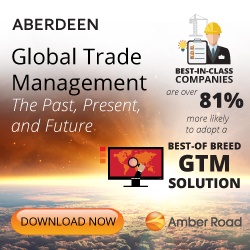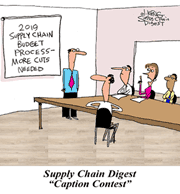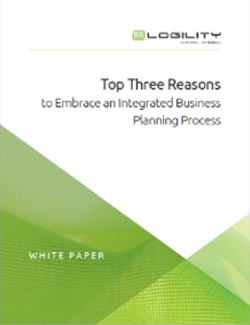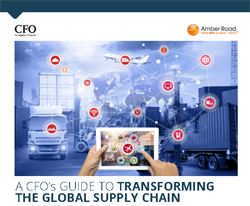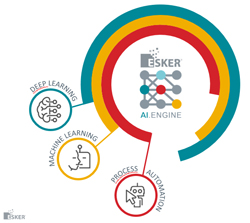The Scariest Supply Chain Worries this Halloween Season
Last year, SCDigest editorial assistant Joan Nystrom suggested I do a column for the Halloween season on what's scary in supply chain.
It was well received, so I am back with that column again this year, with some carry over scares for sure but with some new perspective as well.
To start I will just say I am sure I am among many that have a general foreboding that some kind of shoe is going to drop before long, whether that is in the political, economic, or geo-political domain.
| GILMORE SAYS: |
I believe the robots are taking over - the question is really just the pace, which is uncertain.
WHAT DO YOU SAY?
Send us your
Feedback here
|
First, the tensions on the US political front obviously are extreme, whatever your persuasion. And I think that puts most of us on edge, even if we suppress the worry most of the time.
Just a week ago, I saw this quote from former Federal Reserve chain Paul Volcker, now 91, who said "We're in a hell of a mess in every direction." He added that "Respect for government, respect for the Supreme Court, respect for the president, it's all gone. Even respect for the Federal Reserve."
"How can you run a democracy when nobody believes in the leadership of the country?" he asked.
The supply chain in the end is a reflection of and a reaction to the geo-political and economic environment, and despite the good economic times right now, I am a bit scared that something not good lies in the not too distant future. We are certainly not at the "end of history" as was suggested in the 1990s when the Soviet Union collapsed.
In fact, the number of issues brewing on the global front seem to be rising rapidly. Did you see this one?
A couple of weeks ago, Leon Aron, director of Russian studies at the American Enterprise Institute, wrote a column in the Wall Street Journal that warned war with Russia could be brewing as a result of changes to Russian pension policies.
What?
Here's the deal: There is growing public protest from the Russian working class against a law passed by Putin meant to save the near broke Russian treasury $15 billion a year by 2024 by gradually increasing the retirement age to 65 from 60 for men, and to 60 from 55 for women.
At first glance, the reform doesn't seem dramatic enough to stir such passions, but life expectancy for Russian men is under 67, not even two full years past the new, higher-than-ever retirement age. Many men fear they'll literally be worked to death. Putin's popularity is falling sharply, largely due to this pension change.
As he has done before with Crimea, Aron says Putin may fall back on generating patriotic support by launching a military action - and likely targets for such a move would be to "free" the heavily Russian-speaking enclaves in Estonia and Latvia - both NATO countries.
Does NATO respond to such a move, and risk creating a hot war - or not react and expose NATO's failure to support its members, with other big implications?
This is all speculation of course, but to me is worth mentioning just because the Russian situation is just one of so many global hotpots.
The number 1 of which may be China's continued claim to what were really a series of rocks and outcroppings in the South China Sea, upon which it has built a series of artificial islands far from the Chinese mainland - and then started arming them and building landing strips.
The US and many other nations in the region vigorously reject these Chinese claims and island building, and indeed in 2017 there was ruling by the Permanent Court of Arbitration in The Hague which said there was no legal basis for China's maritime claims. China says that ruling is invalid.
And the tensions are getting worse, not better. As the US continues occasional sailings of military ships near the islands to assert right of passage, China is responding more aggressively.
After the US sailed a Navy destroyer within 12 nautical miles of the disputed islands in early October, China's defense ministry said that "The US side repeatedly sends military ships without permission into seas close to South China Seas islands, seriously threatening China's sovereignty and security, seriously damaging Sino-U.S. military ties and seriously harming regional peace and stability."
It added that "China's military is resolutely opposed to this. The Chinese armed forces will continue to take all necessary steps to protect the country's sovereignty and security."
A Chinese Navy ship came within just a few yards of the US Destroyer, almost causing a collision. The US promises more such sailings.
This is serious stuff. How serious? Lt. Gen. Ben Hodges, retired head of the US Army in Europe, recently said that it's likely the United States will be at war with China soon enough.
"I think in 15 years - it's not inevitable, but it is a very strong likelihood - that we will be at war with China," Hodges said at a recent conference.
 That of course would be cataclysmic. But it doesn't have to go that far for our supply chains to be turned on their heads. As I have said before, this is not going to end well. Prepare your supply chain contingency plans accordingly. That of course would be cataclysmic. But it doesn't have to go that far for our supply chains to be turned on their heads. As I have said before, this is not going to end well. Prepare your supply chain contingency plans accordingly.
Finally, there is actually great debate on whether robotics - of both the hardware and software kind - are going to create jobs or wipe out current jobs by the millions - maybe by the tens of millions.
There is no doubt robotics and AI will create many new jobs - someone has to design the robots and write the software code. And robotics could indeed relieve the need for humans to toil away at hard, boring jobs, such as often found in both the manufacturing and distribution sectors.
But those jobs will be replaced by...What?
At the Gartner supply chain conference in May, pundit Fareed Zakaria said that this automation will certainly result in some job disruptions that society will need to create policies and programs to deal with.
But in the end, he was bullish on a world of robots, believing that on the other side humans would be freed of doing mundane tasks and rise to "higher levels of job activities."
Wish I was equally as optimistic - I am not. If three million truck drivers get replaced by self-driving vehicles, I am not sure what direction their higher-level careers are going to go.
In fact, just this week we reported on a Japanese company called Mujin run by a US CEO that is building technology to create distribution centers that rely totally on robots for all warehouse tasks - almost no humans required, other than maybe some technicians to keep the robots running.
Mujin's technology uses robots made by others to control human like-hands to lift cartons on to/off of pallets and to pick individual items from storage bins. It's quite extraordinary.
The company's technology isn't quite perfect - but it's getting close. It is going to be piloted in DCs in Japan late this year or in early 2019. Is this the warehouse of the future?
I believe the robots are taking over - the question is really just the pace, which is uncertain. The impact on supply chain costs may be good, but the potential impact on society is truly scary - none of us know what is on the other side of this revolution. I am worried.
Finally, I am concerned about the changes in the landscape wrought by digitization and ecommerce. Venerable Sears on its deathbed. Malls across the country is serious jeopardy. Self-driving electric cars, which in the end will put millions of mechanics, insurance salespersons and claims adjusters, and more out of jobs. On this one, I agree it may all be better in the end - but like most I am a little worried about how the world works in this new era.
And finally, my beloved baseball's age demographics are horrible, which concerns me greatly even if it has nothing to do with supply chain.
So there you have my top scary things in the supply chain to be worried about this Halloween. Let's hope the worst we get in years ahead are few smashed pumpkins.
Any reaction to these supply chain Halloween scares? What is frightening to you in the supply chain right now? Let us know your thoughts at the Feedback section below. |



![]()

![]()

![]()



